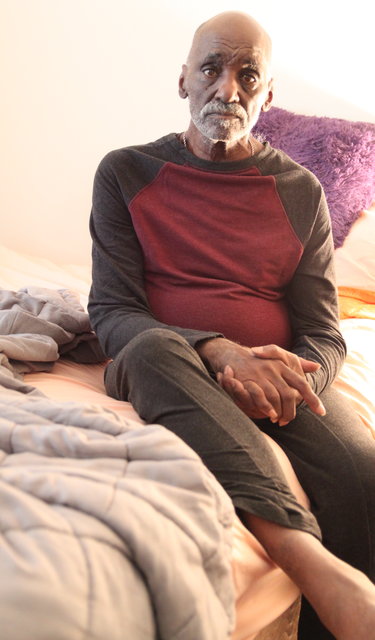Jay Coleman has used his own prison experience to help others
The Enterprise — Elizabeth Floyd Mair
Jay Coleman, who has terminal liver cancer, started and ran a pre-entry mentoring program, designed to help people get through prison sentences and then successfully rebuild their lives. He did what he then went on to teach others to do: turn prison into a positive experience.
GUILDERLAND — Jay Coleman is dying of liver cancer. When he takes stock of his life, he sees reason for both pride and regret.
“I’m not proud that I spent 25 years in prison,” said Coleman, who is 69. “But I’m proud that I survived, and that I helped others survive,” he said.
Coleman was referring to the unique pre-entry mentoring program that teaches people who are headed to state prison what to expect and how best to survive and thrive. The program starts before they ever set foot inside prison.
Coleman is the program’s only mentor.
Dressed in a sweatsuit on Thursday, he spoke from the bed where he had been resting in the spare room of his wife’s Guilderland apartment. Alison Coleman has been caring for him since he fell ill.
Their relationship did not survive unchanged through his 25 years of incarceration, she told The Enterprise earlier. The Colemans had a 1-year-old child when he went to prison. Alison Coleman regularly drove to visit — he served time in 15 different prisons. They also had family reunions, which she said allow families to spend about 46 hours with an inmate in a private space behind prison walls. The couple conceived another child through the family-reunion program.
They lived separately after his release, but have never been divorced.
In agreeing to an Enterprise interview, Alison Coleman said that, because of her husband’s lack of energy, he could commit only to 10 minutes. “Think of the questions you really want to ask,” she said.
Jay Coleman spent a quarter-century in prison and got out a little over a decade ago. His crime involved “$18, no injuries, no weapons,” his wife told The Enterprise earlier.
Eventually, Coleman and Jonathan Gradess, the now-retired executive director of the New York State Defenders Association, created a pioneering pre-mentoring program that helps people know what to expect and how best to survive and thrive in state prison.
The New York State Defenders’ Association is a not-for-profit organization that works to improve the quality and scope of publicly-supported legal representation to people with little money.
The pre-entry mentoring program starts before prisoners begin their sentences, to maximize its effect.
Jay Coleman didn’t start out his time in prison naturally knowing the things he now teaches others, he said. He learned “through trial and error, like most things,” he said simply.
The idea of the mentoring program is, Coleman said, “to find ways to make this into a positive experience, rather than the negative it’s set up to be.”
He taught people heading into prison what he called “the mantra,” which is that they need to plan on coming out of prison “10 times smarter and 10 times stronger.”
If anyone were to approach, to offer them a distraction like prison sex or marijuana that could land them in trouble if it were discovered, they should respond with, “All I do is study and work out,’” he would tell them.
They should respond, he continued, “No, I don’t need that, if it’s not there to help me get out sooner.”
The important thing, he said, is to back up words with action. “You have to be the mantra. You can’t just mouth it. Every time somebody comes by your room, they should see you with a book in your hand, or working out.”
Coleman estimated that he has mentored about 100 people, from before incarceration and throughout their sentences.
When he first met with prisoners, he would find out what their special stresses were, said Anne Rabe of the Defenders Association. Then he would not only customize the program for them, but also stay in touch, by phone and email, throughout their time in prison.
There are many programs that help prisoners with re-entry into society upon their release, said Anne Rabe, organizing coordinator for the Defenders’ Association, but few that begin to help even before people enter prison.
The idea for the program came about, Jay Coleman recalled, when a couple approached his wife to say that their teenage son was headed to prison and to ask, with some desperation, what they could do to help him prepare.
Alison’s life, like Jay’s, has been devoted to helping people cope with prison; her focus has been on helping families. Alison was then running a not-for-profit organization she created, Prison Families of New York State.
Their attorney had referred the couple to her, Alison Coleman said. She met with them a few times, with Jay, and then withdrew and let them work specifically with him.
It just grew from there, Jay Coleman said. Eventually, he partnered with the Defenders Association to create the program that, as Rabe describes it, teaches people to work within prison rules, deal with tensions and anxieties, and stay out of dangerous situations.
The program set out to help prisoners develop the skills they would need to re-enter the community with achievable goals, including employment, housing, and restoring their families, according to a description on the association’s website.
“The program itself is pretty much intact. There’s a written curriculum, and a video,” Jay Coleman said of the program’s future. “All it would take is to train some mentors,” he added.
It was because of a lack of funding that Coleman was the only mentor, Rabe said.
The association is now working with a not-for-profit in New York City to try to adapt Jay Coleman’s customized, one-on-one mentoring program to a group-session model, Rabe said, so it can be used to prepare inmates at Rikers Island as they await transfer to state prison.
Rabe said the association hopes to provide a copy of Coleman’s curriculum to all of the county public defenders in the state, so that all of New York’s public defenders can give it to clients who might need it.
“A very wise soul” is the way Rabe described Jay Coleman. “He’s a very caring, compassionate person, someone with real integrity,” she said. Rabe of the Defenders Association has set up a GoFundMe account, called “Step Up for Jay Coleman,” to help Alison Coleman with expenses for his health-care needs, including medications, a special diet, and a home health aide.
Jay Coleman’s achievements began while he was still in prison, Rabe wrote on the GoFundMe page. He became a law clerk and a certified legal research. He mentored many people by teaching youth about sportsmanship as a coach for basketball, baseball, and football. He provided dispute mediation, especially with gangs, and taught violence prevention.
Rabe calls the cause of Coleman’s cancer “tragic.” She writes on the GoFundMe page that his liver cancer was caused by “many, many years” of being denied, while in prison, treatment for his hepatitis C.
Palliative care has started, Alison Coleman said by phone last week. “We’re just trying to focus on making each day as good as it can be.”
She is getting her husband’s affairs in order for him and serves as his conduit to friends and family, taking calls from the many people who want to see him. “I make sure he’s connected to people if he wants to be. So far he does,” she said.
Alison Coleman says the doctor told her to get her husband’s affairs in order, which she is doing. She also makes sure that he can do the things he has enough energy to do and that he can stay connected with people.
On Christmas Eve, the Colemans planned to drive to Memorial Sloan Kettering, a cancer center in New York City, for a second-opinion interview and to make it a fun weekend: listening to Christmas carols, Alison Coleman said, and visiting a friend briefly.
He is happy, Jay Coleman said, to have had family and friends, all these years, to help him through.
Their two children and their three grandchildren come to visit often, his wife said.
Sitting at the end of his bed, Alison Coleman said she and Jay have remained very close. “We have children together, and grandchildren. We have a new baby grandchild together. We’re good,” she said.



